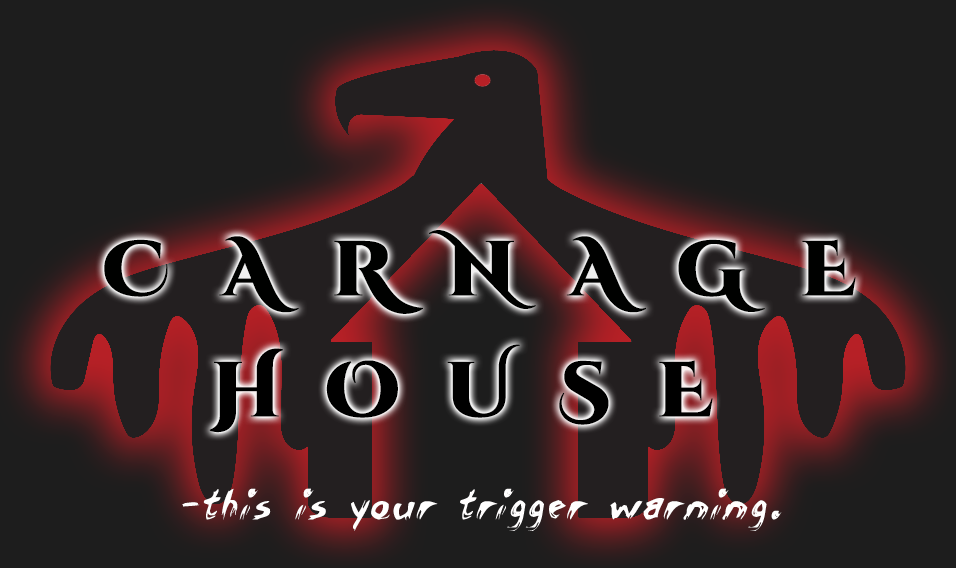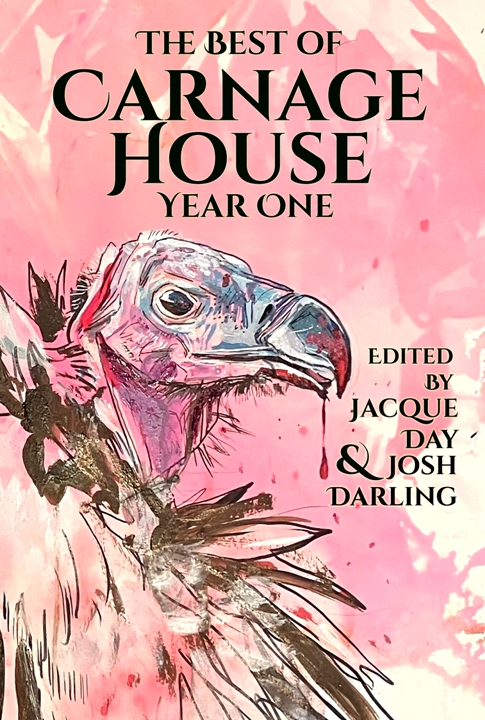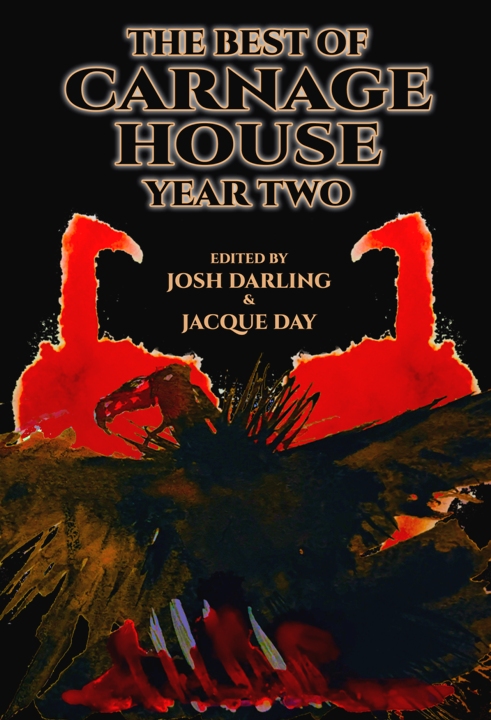
On this month's Special Page:
The editor of Carnage House Magazine, Josh Darling, gives great advice about email cover letters and how to handle rejections in a professional manner.


Josh Darling is the editor-in-chief at Carnage House. He fell in love with the works of Clive Barker and the anthologies put out by Pocket Books in the 90s. Throughout high school, he wrote gross stuff. Some of it got published. He started abusing words professionally in 2014 as a ghostwriter and book doctor. Under his name, his stories have appeared in anthologies with Richard Chizmar, Elizabeth Massie, Philip Fracassi, and Gwendolyn Kiste. His horror fiction has appeared in The Horror Zine, Siren's Call, and numerous publications from Hellbound Books. He started Carnage House with the feeling there are many publishers of splatter/extreme horror books, but few for short stories. As an editor, he looks to help writers develop their craft.
Find Carnage House HERE
Basic Cover Letter and Rejection Etiquette
or
I Can’t Believe I’m Writing Something So Obvious
by Josh Darling
Here’s a “Career Safety Guide” that some of you should take seriously. Remember that editors have many friends. It’s our gig as writers to make editors happy so that they will be optimistic when reading your submission.
The writing community is small.
The horror writing community is smaller.
We all know each other or know of each other. You piss off an editor in say, California, their friends—who are both editors and writers, are going to know about it all over the world.
Thank you, social media.
A typical cover letter should be short. It should include the word count and genre. This way if the word count or genre is wrong, they won’t have wasted their time reading. They’ll automatically reject you. It should mention something from the submission guidelines—showing you read them. It should give the setup of the story. Don’t tell the plot—that’s the function of the story. It should reveal how the story is meaningful.
Your second paragraph should be about your writing background.
Here’s a sample cover letter. I tend to be a sarcastic kind of guy, so don’t copy this word for word, but you get the general idea:
Dear [Editor’s name here],
“Vanilla Sun’s Eye,” is a 2,345 word horror story. I was sure to keep it within your 2,000 to 3,000 word limit as per your submission guidelines. “Vanilla Sun’s Eye” is the story of a psychotic mouse butchering children and eating their flesh. Since your last issue focused on cannibalistic themes, I felt this might be a good fit.
This is my first attempt at writing. Most of it I wrote while huffing gasoline and paint thinner.
Thanks for your time,
[Some writer]
That’s it. Don’t write anything more. If you’ve been published other places, change your second paragraph to read:
Previously, I’ve been published in The Horror Zine, Dark Murmurs, and other magazines and anthologies. My complete resume is available upon request. This story was written under the influence of a full moon and is meaningful to me as I am a lunatic.
Don’t tell the editor how they need to publish you—this will annoy them.
Don’t tell the editor “how good” you think the story is.
Never tell the editor how much they will love your story.
And never ever tell the editor how other people have read your story and rave about it (The editor will assume it is your family members).
Don’t tell them you’re famous—famous people don’t need to say it.
Never come off as arrogant. Many editors don’t start reviewing their stories with hope. They hit that slush pile knowing there is going to be about 5%—10% out of 200 stories that’ll be good. Of that “good” maybe 1% will be great. If you’re great, you don’t need to tell people. Everyone else will figure it out for themselves.
Now, to talk about the thing that gets more “bad behavior.”
REJECTION.
If it still stings, you need more rejections to learn that this is part of the writing process for most.
But who is rejecting you?
With small publications, you will usually know the name of the editor. A small publication will often give more personal responses.
With larger publications, you might be getting rejected by a slush reader. Most slush readers are at the bottom of the totem pole experience wise—but not always. I’ve met these slush readers. They legit might not understand what you’re doing. Especially, if you have a unique style.
If you write in your cover letter “I don’t use semicolons,” they may read your story, see a period separating two independent clauses that should be joined with a semicolon, and reject you. They’re not going to remember what you wrote in a cover letter. They might think you shouldn’t play with the rules of the English language.
Don’t assume that all slush readers are ignorant or starting out. It’s a great experience and everyone should do it. It’s a great education. You’ll see all the same things that writers do. The bigger reality is you have no way of telling who is rejecting you, unless they include their name in the email. That’s no excuse for you to be rude, because although you may not know who the editor is, they know who you are.
Remember this is a small community.
Don’t kick the beehive. The editor is the queen bee.
You’re a toddler who will go into anaphylaxis with sting one.
Which brings me to: Never respond in anger to a rejection letter. This point is so important that I have to say this again in bold letters: Never respond in anger to a rejection letter!
It will only hurt your career.
There are two types of rejections: the form letter and the personal rejection.
If you get a form letter, don’t respond. Dry your tears and walk it off. This game is about getting as many rejections as possible. Every rejection is one rejection closer to finding the right place for your work.
You’ll write more stories.
Not all of them will be published.
That’s okay.
Don’t respond at all to the form letter. It’s a waste of everyone’s time.
The other type of rejection is the personal one:
Dear [Writer],
We regret to inform you we’re going to pass on “My Awesome Short Story My Mom Likes.” You had some really good ideas in this, but the characters weren’t fleshed out enough. The story needed more action—things should happen in a story. In our submission guidelines, it states “we won’t publish excessive gore,” so next time, no incest-based “wet” necrophilia. Also, it’s okay to pee on Santa, but peeing in him is a hard “No.”
Best of Luck,
[Name of an awesome editor who read your work.]
If all you read from a letter like this is “… we’re going to pass on …” then you don’t know how to read. This editor is saying “Great job, here’s what you need to do so next time your work will be what I’m looking for.”
Your response, if any, should be “Thank you, I’m on it,” or “Thanks for your input and kind words,” or the bold “Thanks, if I made those changes could I resubmit it?”
Always thank them. This means they put in time and effort. Don’t try chatting them up. They’re busy and just did you a favor.
Rejection only feels personal. It’s not personal until you give it a reason to be.
If you respond poorly to this rejection letter with an at best “You don’t know what you’re talking about!!!!” to at worst “Go fuck yourself!!!” you’re not just losing out at being published at that magazine. Let me remind you:
Remember: The writing community is small.
The horror literature community is smaller.
We all talk.
At best, the damage will be contained to that publisher with whom you just had a temper tantrum.
At worst, you’ll have a reputation as a jackass. There are famous jackasses who don’t get published because everyone knows who they are. These jackasses are frequently blocked by outstanding editors. I won’t name names. Give it some time. It might take a few years, but you’ll run into a jackass sooner or later or at least hear about them.
It’s common sense you shouldn’t tell people to fuck themselves. As an editor who is friendly with other editors, I hear all about it through the grapevine. Sending a picture of a finger or a body part in response, especially genitals, is also taboo—one I can’t believe I’m mentioning.
I hope these guidelines of basic etiquette are helpful.

